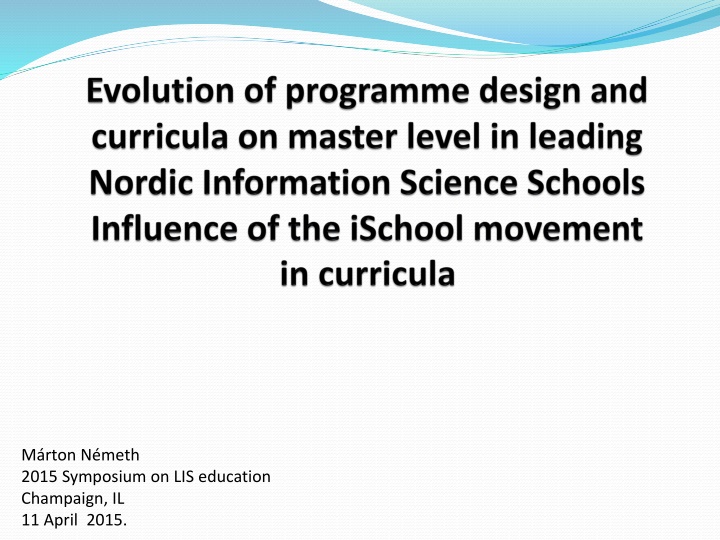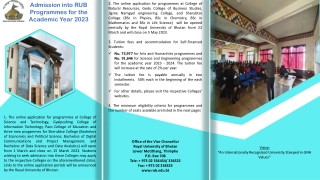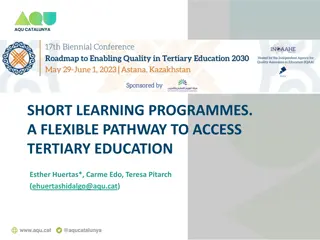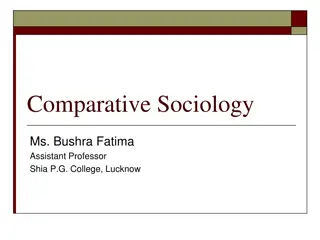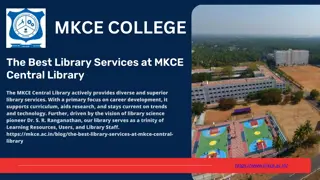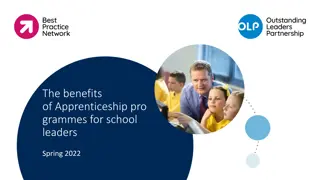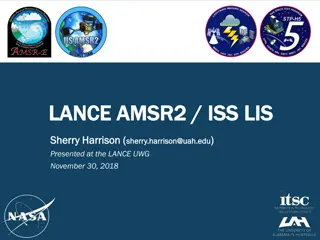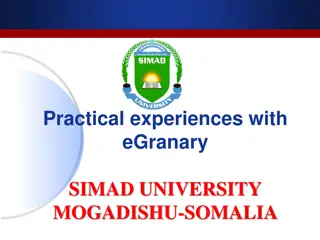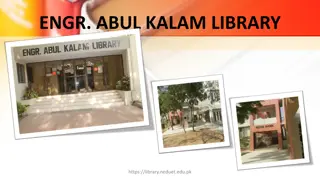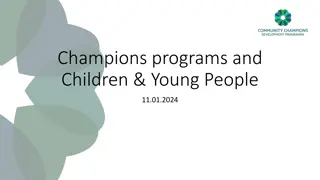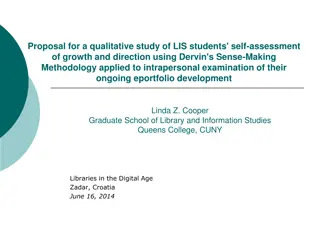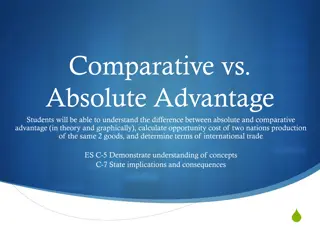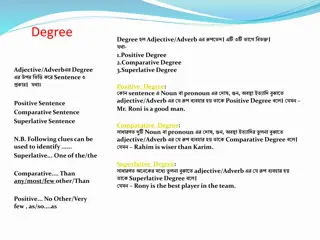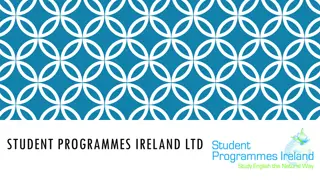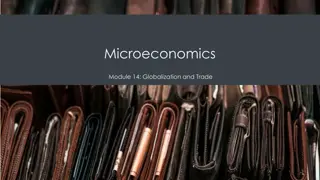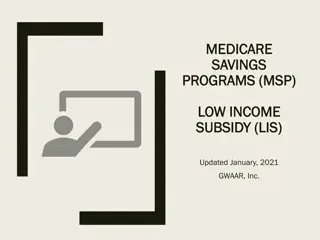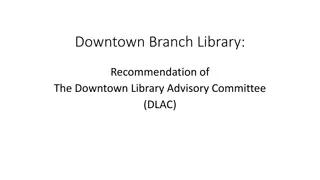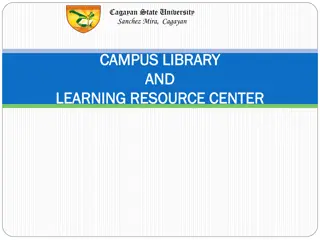Comparative Analysis of LIS Master Programmes in Digital Library Education
Framework analysis of LIS master programmes focusing on the Digital Library Master Programmes. Comparative study on curriculum, theory-practice balance, education forms, and historical context. Qualitative research methodology with literature review and discussions.
Download Presentation

Please find below an Image/Link to download the presentation.
The content on the website is provided AS IS for your information and personal use only. It may not be sold, licensed, or shared on other websites without obtaining consent from the author.If you encounter any issues during the download, it is possible that the publisher has removed the file from their server.
You are allowed to download the files provided on this website for personal or commercial use, subject to the condition that they are used lawfully. All files are the property of their respective owners.
The content on the website is provided AS IS for your information and personal use only. It may not be sold, licensed, or shared on other websites without obtaining consent from the author.
E N D
Presentation Transcript
Mrton Nmeth 2015 Symposium on LIS education Champaign, IL 11 April 2015.
General Master Thesis framework in the DILL programme Fourth semester of the Master programme Thesis Credit Value 30 ECTS Oslo, Parma, Tallinn- options to thesis writing Shared basic thesis rules Some specific regulations set by each school Supervisor, Censor from different schools No thesis defence, written evaluation Evaluated on ECTS Scale (A-F)
Thesis idea The three most traditional LIS training institutions Former monopoly: Vocational training then higher education programmes in LIS field Digital Library Master Programmes: DILL-Oslo, Talinn (EST) Parma (IT) DLIS, DiSe- Bor s (SWE) LIS Master: Bor s, Copenhagen, Oslo Why DILL?- common ties in programme development with Bor s, shared module with own master programme in Oslo Comparative analysis of programmes: Elena Maceviciute - Bor s Extended comparison view of this thesis Digital library education elements of LIS Master programmes
Methodology Qualitative comparative project Set major scope and limitations Analyzing programme structures, frameworks, course descriptions, academic articles, programme websites, e-learning interfaces, other related sources Personal discussions: Ragnar Audunson, Helena Francke, Elena Maceviciute Literature review with broad contextualisation of the topic Comparative programme analysis Discussion
Main research issues Main subjects of programme curricula Curricula framework conceptions The balance of theory and practice in curricula elements and course descriptions National focused and international master programmes beyond the same school framework Traditional education forms vs distance education: main features, pros and cons
Literature review: Broad contextualisation of the thesis topic An overview about professional development of digital library education in the US and in Europe iSchool movement Digital Library Curriculum Project European overview with a previous DILL Master Thesis: Comperative analysis on a mainly quantitative ground Nafiz Shuva Historical context of LIS education development in Scandinavia Historical development of targeted library schools
Comparative analysis The main indicators of iSchool influence in the target schools (range of programmes, basic profiles, structures, main conceptions) Detailed comparison of digital library master programmes in the three LIS schools (target groups, programme plans, modular education structure, forms of education) Compare them with the digital library content and modules of LIS Master programmes Describing a joint perspective: Similar topics behind different module structures and specific curricula frameworks
Discussion Main curricula preferences The appearance of main subjects, conceptions, professional education models in curricula Profession-based vs discipline-based education conceptions National vs international programmes Main education frameworks in each schools
Thesis Conclusions Mediation of culture as a fundamental education aim. Content and connection-based approaches To train just IT-technicians in a simply vocational educational sense cannot be a goal! Set broad range of skills and competences in all major library service dimensions related to Arts and Humanities, Social Sciences, IT fields The education modules of each programmes can be compared with each other through their main subject dimensions Priority of subject and content analysis over the institutional framework context Institutional frameworks however describes different education priorities among different programmes and schools
Tom Wilsons (Wilson, 2001) Wenn-diagram about main dimensions of digital library education D Organization is the core: professional background for serving customers and managing services. A People: A community of patrons and librarians B Content: Digitized and born digital content C System: The system in which framework digital information sources can be managed
DLIS 1. Digital library management (15 ECTS) 2. Users and information behaviour in digital environments (15 ECTS) 3. Information retrieval for digital libraries -1 and II (15 ECTS) 4. Technology of digital libraries I and II (15 ECTS) 5. Digitising cultural heritage material (15 ECTS) 6. Digital library research methods (15 ECTS) 7. Master thesis (30 ECTS) DiSe 1. Digital media in the culture and information sectors (7,5 ECTS) 2. Technology of digital libraries (7,5 ECTS) 3. Users and information behaviour in digital environments (15 ECTS) 4. Project management (7,5 ECTS) 5. Elective courses (22,5 ECTS) 6. R & D methods within digital services (15 ECTS) 7. Workplace-related project (15 ECTS) 8. Master thesis (30 ECTS) DILL 1. Research methods and theory of science (15 ECTS) 2. Digital document (15 ECTS) 3. Information and knowledge management (15 ECTS) 4. Human resource management (15 ECTS) 5. Access to digital libraries (15 ECTS) 6. Users and usage of digital libraries: Quantitative and qualitative evaluation (15 ECTS) 7. Internship (a part of 15 ECTS credit value by module number 6) 8. Master thesis (30 ECTS) Subject-based comparison of modules of digital library education master programmes through Elena Maceviciute s model (Maceviciute, 2011) Colour coding: yellow theory and research, lilac use and users, light blue technology related, dark blue project, red management. Note 2: Digital documents is appearing by Maceviciute as yellow, seems to me more light blue on DILL however I did not change the colour of it from the original. Note 3: I put in internship to DILL as 7th element in my opinion it is missing accidentally from the original because the original number of Master Thesis is also 8
LIS Master HIOA, Oslo: First and last module is in common in all tracks.Modules 2-5 are in Knowledge Organization and Retrieval track Module 6 is on Library and Society track 1. Research methods and theory of science (15 ECTS) LIS Master Copenhagen 1. Information and Culture Studies Theories and Traditions (15 ECTS) 2. Interactive dissemination spaces (15 ECTS) 2. Retrieval systems and techniques (15 ECTS) 3. Information organising processes (15 ECTS) 3. Digital documents (Digital Knowledge Organization) (15 ECTS)- Shared with DILL 4.. Innovative communication of culture (15 ECTS) 4. Web technologies (15 ECTS) 5.System Evaluation and User Studies (15 ECTS) 5. Digital libraries in practice 6. Knowledge Media and digitality (15 ECTS) 6. Information organization and knowledge management (15 ECTS) 7. Knowledge and information in organizations (15 ECTS) 7. Master thesis (30 ECTS) 8. Scholarly communication(15 ECTS) 9. Master Thesis LIS Master Bor s (the level of the introductory modules based on the availability of prior LIS qualification on BA level) Amalgamation of former LIS MA and DiSe programmes 1.Library and Information Science as a Research and Professional field (Standard and Advanced level based on prior LIS education experience) 2.Introduction to knowledge organisation (standard level) OR 3. Scientific communication (advanced level) 4.Develop and manage cultural and information activities (advanced level) 5.XML and controlled vocabularies (advanced level) 6.Classification and information extraction (advanced level) 7.Users and information behaviour in digital environments 8.Three Elective courses 9.Workplace-related project 10.Access to Information (advanced level) 11.Research methods 12.Master Thesis Modules with digital library-based subjects and content in all three schools The previous model designed to digital library education programmes can be applied To LIS Master programmes as well.
Basic facts about iSchools in general 59 institutions (ischools.org January 2015) Started in the US, 2005 (dates back to earlier collaboration forms) Nowadays it is a truly global community Lead and promote the information field Responses to strategic research and academic opportunities Substantial sponsored research activity Support and solution for shared challenges Public policy support on collection, organization, dissemination, use, and preservation of information Main course topics: information architecture, design, policy, and economics; knowledge management, user experience design, and usability; preservation and conservation; librarianship and library administration; the sociology of information; and human-computer interaction and computer science. (ischools.org January 2015) Annual iConferences iSchool Caucus
iSchool as a brand The whole iSchool movement is a major initiative as a policy issue in a social and political arena (Bonnici & Burnett, 2009; Saabye, 2011). The iSchool model focuses on the appearance of traditional information related issues in new forms Core courses: No major differences with ALA accredited non iSchools in the US (Bonnici&Burnett 2009, Chu 2012) iSchools are more research-based, mainly with better financial capabilities Broader variety of courses and specialization tracks by iSchools Difficult to get hard data about courses to make comparison among education programmes in different schools
iSchools in the Nordic region Bor s, Copenhagen, Oslo: Curricula development in the past decade- The traditional former library schools have become research and education centres based on a new complex information-based discipline All the main iSchool course topics in different disciplines are represented in local curricula (Copenhagen, Bor s, Oslo). Main concentrations on MA programmes: theory and research, use and users, IT subjects, Management, project work-internship, master thesis Tampere- Computer Science (Informatics) based profile: Research oriented degree programmes in Information Studies and Interactive Media The focus is on information and media practices, computer-human interaction, information retrieval and game studies. All degree programmes are in the field of Natural Sciences. Parallel development: The formulation of curricula design and research capabilities that have formed by the local, national environments, are in harmony with the basic goals of iSchools formed originally in the US
Nordic institutional strategies in the context of iSchool goals Join EU networks, participate generally well-funded EU projects, R&D collaboration forms with the private market stakeholders Internationalization of education and research collaboration: Master and PhD International master programmes in English, and collaboration with partner institutions (Copenhagen-Berlin, DILL, DLIS) PhD programmes: Finding the best experts and research environments for PhD students through the iSchool network Institutional internal multidisciplinary collaboration among various faculties RSLIS fusion with Uni Copenhagen; collaboration with business and IT schools in Bor s, external collaboration with Sk vde Uni college; HIOA model in Oslo Strong collaboration with major information profession actors: cultural institutions, IT industry companies etc. Three research centres in Tampere: CIS (Research Center for Information and Systems) , TAUCHI (Tampere Unit for Computer Human Interaction), TRIM (Tampere Research Center for Information and Media)
Summary Similar challenges towards information-based education programmes in Europe and in the US Find the way of re-establish curricula elements and re- branding schools that educating for information-based professions. Develop strong research capabilities Interplay of global, regional, national and local arenas Serving local needs in a global context with joint education and research resources. Partnership and common interests with iSchool partners serves local institutional strategic goals in the Nordic countries
Bibliography Audunson, R. (2014). PhD Programme in Library and Information Science. Retrieved December 15, 2014, from http://www.hioa.no/content/download/25641/324312/file/Programplan PBIB Eng 2014.pdf Audunson, R., & Gjestrum, L. (2012). Training of librarians in Oslo. Scandinavian Library Quarterly, 45(3), 10 12. Retrieved December 15, 2014, from http://slq.nu/?article=volume-45-no-3- 2012-7 Bonnici, L. J., & Burnett, K. (2009). Everything Old is New Again: The Evolution of Library and Information Science Education from US to iField. Journal of Education for Library & Information Science, 50(4), 263 275. Borenstein, I. (2013). Biblioteksh gskolan ans ker om att bli en iSchool. Retrieved December 15, 2014, from http://www.hb.se/Bibliotekshogskolan/Om- institutionen/Aktuellt/Nyheter/Nyhet/?NewsId=34385 Borlund, P. (2010). The Case of the Royal School of Library and Information Science: A European iSchool (pp. 1 10). Taipei. Retrieved December 15, 2014 from http://www.glis.ntnu.edu.tw/2010conference/docs/proceeding047-056.pdf Braman, S. (2008). Theorizing the Impact Of IT On Library-State Relations. In G. Leckie & J. Buschman (Eds.), Information technology in librarianship: critical approaches (pp. 105 126). Westport, CT: Libraries Unlimited. Christensen, B. (2012). Synergier ved intensiveret samarbejde med KU - IV A - Det Information ... Seneste Insights Modtag Insight IVA p mail Synergier ved intensiveret samarbejde med KU. Retrieved December 15, 2014, from http://www.iva.dk/omiva/nyheder/insight/12-05-24/synergier-ved-intensiveret-samarbejde-med-ku/ Chu, H. (2012). iSchools and non-iSchools in the USA: An examination of their master s programs. Education for Information, 29 (July 2012), 1 17. doi:10.3233/EFI-2010-0908 Digital Library Learning. (2014). Retrieved December 15, 2014, from http://dill.hioa.no Doracic, A. (2012). iSchools iCaucus, Inneb rd, krav och erfarenheter. Boras. Retrieved from http://hdl.handle.net/2320/11735 Lopatovska, I., & Ransom, E. (2014). The state of L-Schools: Intellectual diversity and faculty composition. Journal of Librarianship and Information Science. doi:10.1177/0961000614533718 Maceviciute, E. (2011). Education for digital libraries: library management perspective. International Conference on Digital Library Management (ICDLM): Extending benefits of modern technology to public, academic, and special libraries, 11-13 January, 2011, Science City, Kolkata. Kolkata, India: TERI, Raja Rammohun Library Foundation. Retrieved from http://hdl.handle.net/2320/9660 Membership in the iSchools. (2012). Retrieved December 15, 2014, from http://ischools.org/about/charter/membership-in-the-ischools/). Pharo, N. (2005). Nordic networking: cooperation in Nordic LIS research. IFLA Journal, 31(2), 194 198. Retrieved December 15, 2014 from http://search.proquest.com/docview/57602087?accountid=35477 Pomerantz, J., Wildemuth, B. M., Yang, S., & Fox, E. A. (2006). Curriculum development for digital libraries. Proceedings of the 6th ACM/IEEE-CS joint conference on Digital libraries - JCDL 06 (p. 175). New York, New York, USA: ACM Press. doi:10.1145/1141753.1141787 Royal School of Library and Information Science. (2012). Internationalization Strategy of RSLIS (p. 12). Copenhagen. Retrieved December 15, 2014,from http://www.iva.dk/media/323698/strategy_for_internationalization.pdf Saabye, H. (2011). iSchools har forskningsh jden - IVA - Det Informationsvidenskabelige Akademi.pdf. Retrieved December 15, 2014, from http://www.iva.dk/omiva/nyheder/2011/02/ischools-har-forskningshoejden/ School of Information Sciences. (2014). PhD Curriculum Guide. Retrieved December 15, 2014, from http://www.uta.fi/sis/en/doctoral_studies/curriculumguide.html Shuva, N. Z. (2011). Digital Library Education in Europe. Oslo University College of Applied Sciences. Royal School of Library and Information Science, Copenhagen University. Academic Regulations for the Master s Programme in Library and Information Science The 2013 Regulations (2013). Retrieved December 15, 2014 from http://www.iva.dk/media/453472/2013_curriculum_rslis_in_english.pdf The Characteristics of iSchools. (2012). Retrieved December 15, 2014, from http://ischools.org/about/charter/ The Purpose of the iSchools. (2012). Retrieved December 15, 2014, from http://ischools.org/about/charter/ Wilson, T. D. (2001). Mapping the curriculum studies. New Library World, 102(11/12), 436 442.
THANK YOU! Full paper on iSchool relationships: https://www.academia.edu/10339008/iSchool_community _and_Scandinavian_library_schools The master thesis can be found: https://www.academia.edu/5278520/Digital_library_educa tion_on_Master_level_in_Bor s_Copenhagen_and_Oslo_Q ualitative_case_study
